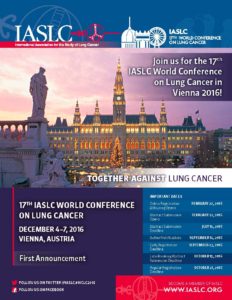 Tuesday, December 6, 2016
Tuesday, December 6, 2016
Vienna, Austria—December 6, 2016—Today’s press briefing at the IASLC 17th World Conference on Lung Cancer (WCLC) focused on active prevention, with researchers sharing results of clinical drug trials that have shown reduction in risk of disease progression among lung cancer patients. Abstracts and full versions of news releases for each topic covered are available, including the complete article on the AURA3 Trial that is published in today’s New England Journal of Medicine.
Results from the AURA3 trial show osimertinib reduces risk of disease progression by 70 percent in patients with non-small cell lung cancer.
Patients enrolled in the AURA3 trial who received osimertinib experienced a 70 percent reduction in progression-free disease compared to patients enrolled in a control group who only received chemotherapy. The results of the study were presented at the IASLC 17th WCLC by Dr. Vassiliki Papadimitrakopoulou, of MD Anderson Cancer Center in Houston, and were published in the New England Journal of Medicine. To read the full news release, click here.
Chinese researchers demonstrate that icotinib creates better progression-free survival with fewer side effects than whole brain radiation in non-small cell lung cancer patients with brain metastases.
Patients whose lung cancer spreads to their brain typically have less than six months left to live, but research presented today suggests that using icotinib increases longevity in these patients compared to whole brain radiation and chemotherapy combined. The research was presented by Yi-long Wu, Guangdong Lung Cancer Institute, Guangdong General Hospital & Guangdong Academy of Medical Sciences, China. For the complete news release, click here.
Results from ASCEND-4 trial show patients receiving first-line ceritinib experienced a 45 percent risk reduction of disease progression compared to chemotherapy.
Patients who received first-line ceritinib experienced a 45 percent risk reduction for advanced (ALK+) and non-small cell lung cancer compared to a control group that received chemotherapy, according to research presented by Dr. Gilberto De Castro Jr. of the Instituto do Cancer do Estado de Sao Paulo, Brazil. For the full news release, click here.
New lung cancer tumor staging manual to shape lung cancer clinical treatment.
A revised tumor classification, based on more than 70,000 non-small cell lung cancer patients and 6,100 small cell lung cancer patients, is now available to lung cancer specialists around the world in the form of the 8th Edition of the Tumor, Node, and Metastasis (TNM) Classification. The new edition is published by the Union for International Cancer Control, the American Joint Committee on Cancer, and the International Association for the Study of Lung Cancer (IASLC) in their respective staging manuals. According to Dr. Ramon Rami-Porta from Hospital Universitari Mutua Terrrassa, Terrassa, Spain, the new edition seeks to improve the classification of the anatomical extent of lung cancer. To read more about the new Staging Manual, click here.
In 1998, the IASLC established its Lung Cancer Staging Project, an effort to collect a significant, international database of lung cancer cases and their anatomical classifications. The IASLC collected and published a large amount of data regarding the size of tumors, lymph node involvement, and metastatic status which is then presented to the Union for International Cancer Control (UICC) and the American Joint Committee on Cancer (AJCC) for evaluation. Before the IASLC Staging Project, data collected for staging of lung cancer came from a smaller group of patients, almost exclusively based in the U.S.
About the WCLC:
The WCLC is the world’s largest meeting dedicated to lung cancer and other thoracic malignancies, attracting more than 6,000 researchers, physicians, and specialists from more than 100 countries. The goal is to increase awareness, collaboration, and understanding of lung cancer, and to help participants implement the latest developments across the globe. Organized under the theme of “Together Against Lung Cancer,” the conference will cover a wide range of disciplines and unveil several research studies and clinical trial results. For more information, visit http://wclc2016.iaslc.org/.
About the IASLC:
The International Association for the Study of Lung Cancer (IASLC) is the only global organization dedicated to the study of lung cancer. Founded in 1974, the association’s membership includes more than 5,000 lung cancer specialists in over 100 countries. Visit www.iaslc.org for more information.
